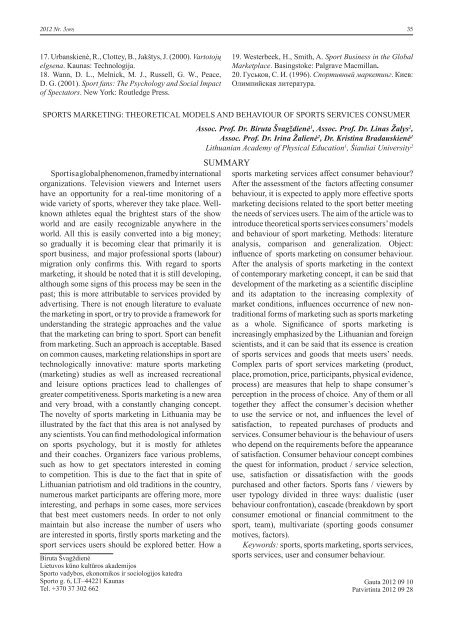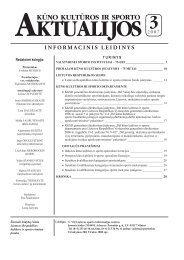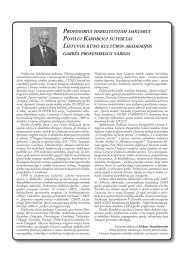Nr. 3 - Lietuvos sporto informacijos centras
Nr. 3 - Lietuvos sporto informacijos centras
Nr. 3 - Lietuvos sporto informacijos centras
You also want an ePaper? Increase the reach of your titles
YUMPU automatically turns print PDFs into web optimized ePapers that Google loves.
2012 <strong>Nr</strong>. 3(69)<br />
35<br />
17. Urbanskienė, R., Clottey, B., Jakštys, J. (2000). Vartotojų<br />
elgsena. Kaunas: Technologija.<br />
18. Wann, D. L., Melnick, M. J., Russell, G. W., Peace,<br />
D. G. (2001). Sport fans: The Psychology and Social Impact<br />
of Spectators. New York: Routledge Press.<br />
19. Westerbeek, H., Smith, A. Sport Business in the Global<br />
Marketplace. Basingstoke: Palgrave Macmillan.<br />
20. Гуськов, С. И. (1996). Спортивный маркетинг. Киев:<br />
Олимпийская литература.<br />
SPORTS MARKETING: THEORETICAL MODELS AND BEHAVIOUR OF SPORTS SERVICES CONSUMER<br />
Sport is a global phenomenon, framed by international<br />
organizations. Television viewers and Internet users<br />
have an opportunity for a real-time monitoring of a<br />
wide variety of sports, wherever they take place. Wellknown<br />
athletes equal the brightest stars of the show<br />
world and are easily recognizable anywhere in the<br />
world. All this is easily converted into a big money;<br />
so gradually it is becoming clear that primarily it is<br />
sport business, and major professional sports (labour)<br />
migration only confirms this. With regard to sports<br />
marketing, it should be noted that it is still developing,<br />
although some signs of this process may be seen in the<br />
past; this is more attributable to services provided by<br />
advertising. There is not enough literature to evaluate<br />
the marketing in sport, or try to provide a framework for<br />
understanding the strategic approaches and the value<br />
that the marketing can bring to sport. Sport can benefit<br />
from marketing. Such an approach is acceptable. Based<br />
on common causes, marketing relationships in sport are<br />
technologically innovative: mature sports marketing<br />
(marketing) studies as well as increased recreational<br />
and leisure options practices lead to challenges of<br />
greater competitiveness. Sports marketing is a new area<br />
and very broad, with a constantly changing concept.<br />
The novelty of sports marketing in Lithuania may be<br />
illustrated by the fact that this area is not analysed by<br />
any scientists. You can find methodological information<br />
on sports psychology, but it is mostly for athletes<br />
and their coaches. Organizers face various problems,<br />
such as how to get spectators interested in coming<br />
to competition. This is due to the fact that in spite of<br />
Lithuanian patriotism and old traditions in the country,<br />
numerous market participants are offering more, more<br />
interesting, and perhaps in some cases, more services<br />
that best meet customers needs. In order to not only<br />
maintain but also increase the number of users who<br />
are interested in sports, firstly sports marketing and the<br />
sport services users should be explored better. How a<br />
Biruta Švagždienė<br />
<strong>Lietuvos</strong> kūno kultūros akademijos<br />
Sporto vadybos, ekonomikos ir sociologijos katedra<br />
Sporto g. 6, LT–44221 Kaunas<br />
Tel. +370 37 302 662<br />
Assoc. Prof. Dr. Biruta Švagždienė 1 , Assoc. Prof. Dr. Linas Žalys 2 ,<br />
Assoc. Prof. Dr. Irina Žalienė 2 , Dr. Kristina Bradauskienė 1<br />
Lithuanian Academy of Physical Education 1 , Šiauliai University 2<br />
Summary<br />
sports marketing services affect consumer behaviour?<br />
After the assessment of the factors affecting consumer<br />
behaviour, it is expected to apply more effective sports<br />
marketing decisions related to the sport better meeting<br />
the needs of services users. The aim of the article was to<br />
introduce theoretical sports services consumers’ models<br />
and behaviour of sport marketing. Methods: literature<br />
analysis, comparison and generalization. Object:<br />
influence of sports marketing on consumer behaviour.<br />
After the analysis of sports marketing in the context<br />
of contemporary marketing concept, it can be said that<br />
development of the marketing as a scientific discipline<br />
and its adaptation to the increasing complexity of<br />
market conditions, influences occurrence of new nontraditional<br />
forms of marketing such as sports marketing<br />
as a whole. Significance of sports marketing is<br />
increasingly emphasized by the Lithuanian and foreign<br />
scientists, and it can be said that its essence is creation<br />
of sports services and goods that meets users’ needs.<br />
Complex parts of sport services marketing (product,<br />
place, promotion, price, participants, physical evidence,<br />
process) are measures that help to shape consumer’s<br />
perception in the process of choice. Any of them or all<br />
together they affect the consumer’s decision whether<br />
to use the service or not, and influences the level of<br />
satisfaction, to repeated purchases of products and<br />
services. Consumer behaviour is the behaviour of users<br />
who depend on the requirements before the appearance<br />
of satisfaction. Consumer behaviour concept combines<br />
the quest for information, product / service selection,<br />
use, satisfaction or dissatisfaction with the goods<br />
purchased and other factors. Sports fans / viewers by<br />
user typology divided in three ways: dualistic (user<br />
behaviour confrontation), cascade (breakdown by sport<br />
consumer emotional or financial commitment to the<br />
sport, team), multivariate (sporting goods consumer<br />
motives, factors).<br />
Keywords: sports, sports marketing, sports services,<br />
sports services, user and consumer behaviour.<br />
Gauta 2012 09 10<br />
Patvirtinta 2012 09 28
















